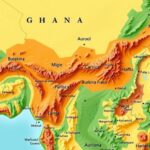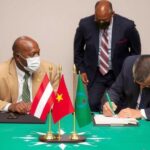Politics
AFRICA, ALLIANCE OF SAHEL STATES, ARMED FORCES, ASIA, BURKINABE ARMED FORCES, CHINA, CONVERSATION, CONVERSATION AFRICA, CORRUPTION, COUP, DAMIBA, DANIEL EIZENGA, ECOWAS, EUROPE/ASIA, GEORGES NAMOANO MILITARY ACADEMY, IBRAHIM TRAORE, IBRAHIM TRAORÉ, KABORE, KABORÉ, MALI, MINUSMA, NORTH CENTRAL REGION OF BURKINA FASO, OF, OUAHIGOUY, PAUL HENRI DAMIBA, PÔ, PO, REGIONAL COOPERATION, ROC, ROCH MARC KABORÉ, THOMAS SANKARA, TR, TRAORÉ, TRAORE, TURKEY, UNITED NATIONS MULTIDIMENSIONAL INTEGRATED STABILIZATION MISSION, UNITED NATIONS MULTIDIMENSIONAL INTEGRATED STABILIZATION MISSION TO MALI, UNIVERSITY, UNIVERSITY OF OUAGADOUGOU, WEST AFRICA
Omar El-Sharif
Leadership and Challenges of Captain Ibrahim Traoré in Burkina Faso
Ibrahim Traoré, an interim leader of Burkina Faso, emerged from a coup against Lieutenant Colonel Paul Henri Damiba in September 2022. His leadership has been characterized by both popular support and severe repression of dissenting voices. However, the national security has deteriorated dramatically, evidenced by rising violence linked to militant Islamist groups and a deepening humanitarian crisis, raising concerns about the nation’s stability and future governance.
Captain Ibrahim Traoré, the interim leader of Burkina Faso, assumed power after leading a coup against Lieutenant Colonel Paul Henri Damiba in September 2022. At just 37 years of age, Traoré previously supported Damiba during a coup against former President Roch Marc Kaboré earlier that year. Under Traoré’s governance, Burkina Faso has played a pivotal role in the exit of three West African nations from the Economic Community of West African States (ECOWAS), thus forming the Alliance of Sahel States alongside Niger and Mali.
Born in Bondokuy in 1988, Traoré pursued education in Bobo Dioulasso and later attended the University of Ouagadougou. He enlisted in the army in 2010 and underwent officer training at the Georges Namoano Military Academy, graduating as a second lieutenant in 2012. Promoted to lieutenant in 2014, he served with the United Nations Multidimensional Integrated Stabilization Mission in Mali and later participated in counterterrorism operations in northern Burkina Faso, achieving captaincy in 2020.
Following Damiba’s coup against Kaboré in January 2022, Traoré was appointed chief of an artillery regiment. Discontent with Damiba’s diminishing popularity, Traoré and several junior officers orchestrated a coup amid public outrage over military failures, resulting in their capture of power.
Media reports indicate that Traoré and his junta may possess some level of public support, with comparisons to the esteemed revolutionary leader Captain Thomas Sankara noted. However, while both leaders ascended power at age 34, Traoré’s legitimacy appears more uncertain due to military fragmentation. His administration has encountered numerous coup attempts and reports indicate that he has repressed dissenting voices harshly, implicating a more precarious hold on power than portrayed.
To bolster his authority, Traoré has initiated a restructuring process, redirecting public revenue toward defense. He mobilized a civilian militia, the Volunteers for the Defence of the Homeland, to combat extremism, but instances of forced conscription for frontline service have emerged, resulting in casualties. Furthermore, the strategy’s efficacy remains questionable, amid ongoing violence and humanitarian crises within the nation.
Traoré’s regime has garnered attention from Russian entities, including the Wagner Group, which are believed to engage in influence operations post-coup. Traoré has exploited anti-French sentiment, blaming the French for national issues. Following their withdrawal, reports assert that Russian forces, numbering between 100 to 300, have focused on securing Traoré’s regime.
Notably, the security situation in Burkina Faso has deteriorated since Traoré’s ascendance, with a reported 3,059 violent events connected to militant groups, marking a 20% increase from preceding years. Fatalities from militant violence surged from 3,621 in 2022 to an alarming 6,389 in early 2024. The conflict has expanded to jeopardize nearly every region, exacerbated largely along the southern border, with significant underreporting likely.
Moreover, reports indicate that the military has claimed multiple disrupted coup attempts since Traoré’s takeover. The junta has also been responsible for rising civilian casualties due to its operations in the ongoing conflict with extremists—civilian deaths have soared from 721 in 2022 to 1,151 in 2024. The overall violence, along with millions displaced due to conflict, raises concerns of a potential collapse of governance in Burkina Faso,
With a historical context of military dominance in governance since independence, the ramifications of Traoré’s rule threaten to extend far into the future. The insurgency continues to devastate the countryside, further magnifying the humanitarian crisis across Burkina Faso, potentially stunting the development of an entire generation of students impacted by ongoing violence.
In summary, Captain Ibrahim Traoré’s rise to power has been marked by a series of coups and an increasingly precarious governance situation in Burkina Faso. Despite claims of public support, his rule faces significant challenges, including growing violence, humanitarian crises, and retaliation against dissenters. The implications of his leadership extend beyond immediate security concerns, raising longstanding questions regarding the future of political stability in Burkina Faso.
Original Source: theconversation.com








Post Comment